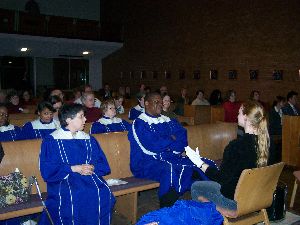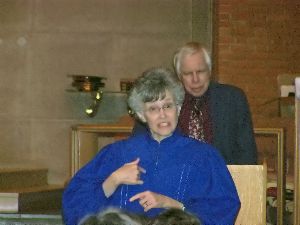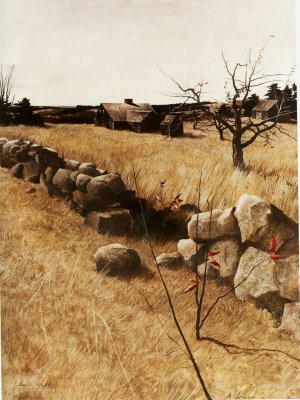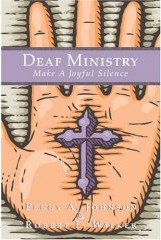|
|
|
|
Rev. Dr. Robert L. "Bob" Walker delivers Sermon
The soloist-director was William Suggs, a deaf-blind member of the Christ United Methodist Church of the Deaf in Baltimore, Maryland, backed by a choir from that church. The selected song was "Wonderful Words of Life," but with "words" changed to "signs", as it is through American Sign Language that the Christian faith is communicated to Deaf culture people and those deaf-blind individuals who rely on tactile signing.
Dr. Eileen Guenther, the seminaryís professor of church music, developed the liturgical aspects of the service that included "A Hymn of Compassion," written by Bob. Dr. Guenther presided at the piano for the service. The Rev. Dr. Peggy A. Johnson, pastor of the Christ United Methodist Church of the Deaf in Baltimore, read the Scripture lessons, and Dr. Bruce Birch, academic dean of the seminary, opened the service with introductory remarks and leading a unison prayer. For Wesley Theological Seminary, the deaf-awareness service was the first of its kind. Prompting the event were some support staff and faculty members who suggested a book autographing reception for Peggy Johnson and Bob Walker, co-authors of Make a Joyful Silence. Peggy, a Wesley Seminary adjunct professor in the field of ministries with Deaf, late-deafened, hard of hearing, and deaf-blind people, encourage the expansion of the book signing to include the Vesper Service in which William and Bob would participate. Each of the two men copes with Usher Syndrome, with William having the Type One form that denotes those persons born deaf and gradually losing their eyesight, and Bob having type two that indicates one being born hard of hearing and becoming blind. More about the Usher syndrome can be found in Signs of Solidarity: Ministry with Deaf, Late-deafened, Hard of Hearing, and Deaf-blind People, and in Deaf Ministry: Make a Joyful Silence. Interpreters for the Deaf people in attendance were Peggy, Carol Stevens, and Mary Gladstone; Carol and Mary are professional social workers in the field of Deaf ministry. For hard of hearing worshipers, the Mardy Walker Memorial Assistive Listening System was available.
Wall Out the Walls Wesley Theological Seminary
Ephesians 2:11-22 and Luke 6:27-36
Robert Frost wrote those opening words in his classic poem called "Mending Wall." Each spring, he and his neighbor carried out the ritual of restoring the stone wall that borders their adjoining New England farms. It's like a game, said Frost, one on each side, scraping fingers and hands as they lift the fallen boulders back in place. There is, Frost tells us, a portion of the field where a wall is ridiculous. On his side is an apple orchard, on the other a grove of pine trees. Why rebuild the wall here, Frost asks his neighbor; after all, the apples won't cross over to devour the pine cones. His dour neighbor wonít laugh; solemnly, he repeats the aphorism he learned from his father and his father from his father: Good fences make good neighbors. Well, yes. Good fences can make good neighbors, if you have a dog to keep from chasing the neighbors' cats, or from leaving evidence of its passage on the neighborís lawns. But, might it also be said that fences can be offensive in that they treat others as potential trespassers or enemies?
Occasionally, walls can be useful, butóas Snoopy observedóthey can also shrink our world. In his poem, Robert Frost says as much: "Before I built a wall I'd ask to know/What I was walling in or walling out...." [4] Nearly two thousand years ago that question was asked by the writer of the tract for the Body of Christ in Ephesus, a Mediterranean area that includes present-day Turkey. That young church was filled with Gentiles who once had been walled off from the grace of God by Jewish laws. To emphasize that law a wall was built inside Jerusalem's fabled temple, beyond which no non-Jew could pass lest he be executed. Incidentally, Jewish women (but no Gentile women) were allowed in the temple, but no farther than the back benches, just inside that wall. Itís tempting to be harshly critical of those long ago Jews, but werenít they like many among us, or even some of us who erect religious or social walls against those whom we despise? And, like those ancient wall-builders, we suppose God loves our walls because God hates those whom we hate. The very fact that the Ephesian document mentions walls suggests that many in the early church forgot that once they were walled out, and now were busy building walls against those whom they scorned, believing God loved their walls. Not so, declared the author. God neither loves their walls nor despises those whom they despise. Let the words attributed to Jesus in tonightís gospel lection teach us that God seeks our compassion, not our hostility; namely, said Jesus, "Be compassionate as God is compassionate toward us" (Luke 6:36)[5]. Thatís good news! God, we can believe, cares deeply about us, deserving or not! And, like God, we can care deeply about others, deserving or not. Later in Ephesians, the writer says as much in that we are to be "imitators of God" (5:1). How, then, can any of us as individuals, the church, a nation receive such good news of promised grace, but then disgracefully build walls to bar those whom we despise or fear? By now you surely understand that I speak not only of literal walls, but even more so of attitudinal walls. Walls of the mind and heart that lock out those whom we judge as religiously, socially, morally, or physically flawed? As one biblical scholar said, for the Ephesian and our churches to build and maintain attitudinal walls flatly denies Jesus is our Christ. [6] Listen again to the words of that long ago Ephesian author that through the mission and message of Jesus God has shattered every dividing wall of hostility. No longer are we "strangers and aliens." Enriched by divine grace and the diversity in people surrounding us, we all are the people of God, "members of the household of God," with Jesus as the cornerstone holding us together (see 2:14, 19f). [7]
In 1957, freshly graduated from seminary, I was appointed to serve the brand new St. Paulís Methodist Church in Vacaville, California. Also new in Vacaville was a state prison whose euphemistic name was "The California Medical Facility." During the last two years of my pastorate in Vacaville, the Protestant prison chaplain recruited me to lead two different Bible classes, one on John, the other on Romans. One of the participants in each class was a Pentecostal minister doing time for sexually molesting young girls in his church. He came up to me at the end of the last series and said that he had finally decided that I was somewhat spiritual. I could not, he said, be fully spiritual until I no longer needed my glasses and hearing aid. There it was, a wall. I should have, but did not refrain from reminding him that I, at least, was free to walk outside the prison walls unchallenged. In Chapter 11 of Make a Joyful Silence, you can read the story of Walter, around whom a dispassionate society built a wall. Like me, Walter has Usher syndrome, a genetic disorder that causes one to be born Deaf or hard of hearing and slowly becoming blind. By his mid-thirties, Walterís eyesight had deteriorated enough to be fired from his job with Goodwill Industries thatís supposed to work with physically challenged people, not fire them. Over a period of two and a half years, it took compassionate efforts by The Rev. Dr. Peggy Johnson, Carol Stevens, and members of the Christ United Methodist Church of the Deaf in Baltimore to destroy the attitudinal walls that denied Walter his entitled Social Security Disability income and vocational rehabilitation services. With the walls finally shattered, Walter completed a year-long training program at the Helen Keller National Center in White Plains, New York. As I said, you can read Walterís story in Chapter 11, plus the study guide for that chapter; however, tonight you can meet him in person. His true name is William, our soloist for this Vesper service. As far as Iím concerned, the truly deaf and blind people are not like William and me, but are those who build or preserve walls around our physically-challenged sisters and brothers. That deafness and blindness includes the current president of the United States and several of his appointees to lifetime positions as federal, district, and supreme court judges and justices who are diminishing the scope and power of the 1990 Americans with Disabilities Act signed into law by the first President Bush. Sad to say, deafness and blindness is also infecting too many of our churches and their leaders who consciously or unconsciously wall out people with losses of hearing, eyesight, or both, along with others coping with physical challenges. Walls are everywhere. But, "Something there is that doesnít love a wall." Might that "something" be God? If so, shall we imitate God and wall out those walls? © 2008 by Robert L. Walker
[2] Robert Frost: Collected Poems, Plays and Prose (Literary Classics of the United States, Inc., New York, 1995), pages 39-40.
Be imitators of God, therefore, as dearly loved children and live a life of love,
|
| ||||

 The beat of the drum was strong, underscoring each syllable, and communicating via feet-felt vibrations to the Deaf choir and its soloist-director. The setting was the chapel of Wesley Theological Seminary, located on the campus of American University in Washington, D.C. The occasion was the seminary's weekly Wednesday Vesper Service for March 5, 2008, designated as a "Deaf-blind Awareness event."
The beat of the drum was strong, underscoring each syllable, and communicating via feet-felt vibrations to the Deaf choir and its soloist-director. The setting was the chapel of Wesley Theological Seminary, located on the campus of American University in Washington, D.C. The occasion was the seminary's weekly Wednesday Vesper Service for March 5, 2008, designated as a "Deaf-blind Awareness event."
 The preacher for the service was the Rev. Dr. Robert L. "Bob" Walker, also a deaf-blind person who is a retired United Methodist minister living in Lacey, Washington. The title for his sermon was "Wall Out the Walls," based on Robert Frostís poem, "Mending Wall," Ephesians 2:11-22, and Luke 6:27-36. The messageís emphasis was on shattering the attitudinal walls built around physically-challenged people in general and deaf-blind persons in particular.
The preacher for the service was the Rev. Dr. Robert L. "Bob" Walker, also a deaf-blind person who is a retired United Methodist minister living in Lacey, Washington. The title for his sermon was "Wall Out the Walls," based on Robert Frostís poem, "Mending Wall," Ephesians 2:11-22, and Luke 6:27-36. The messageís emphasis was on shattering the attitudinal walls built around physically-challenged people in general and deaf-blind persons in particular.
 "Something there is that doesn't love a wall,
"Something there is that doesn't love a wall,  Consider also how isolating fences can be. Snoopy, Charlie Brown's inimitable dog, was an inveterate would-be author. Lucy was his severest critic. She had yet to find a Snoopy manuscript that she liked. Dismissing his latest effort, she said: "You should write a self-help book. You know, for people who are lonely and can't go any place." Dutifully, Snoopy turned back to his trusty typewriter atop his doghouse, and wrote a new title: "How to be Happy Even Though You're Stuck in the Back Yard."[3]
Consider also how isolating fences can be. Snoopy, Charlie Brown's inimitable dog, was an inveterate would-be author. Lucy was his severest critic. She had yet to find a Snoopy manuscript that she liked. Dismissing his latest effort, she said: "You should write a self-help book. You know, for people who are lonely and can't go any place." Dutifully, Snoopy turned back to his trusty typewriter atop his doghouse, and wrote a new title: "How to be Happy Even Though You're Stuck in the Back Yard."[3]
 What that means is that we, as Godís people, are called to wall out the attitudinal walls found everywhere dividing and destroying humankind due to our differences. In this chapel tonight, each of us is different in one way or another; thus, we are the ones being walled out. That, I must say, is expressly true for those among us and around the world who are known as "deaf-blind" people.
What that means is that we, as Godís people, are called to wall out the attitudinal walls found everywhere dividing and destroying humankind due to our differences. In this chapel tonight, each of us is different in one way or another; thus, we are the ones being walled out. That, I must say, is expressly true for those among us and around the world who are known as "deaf-blind" people.